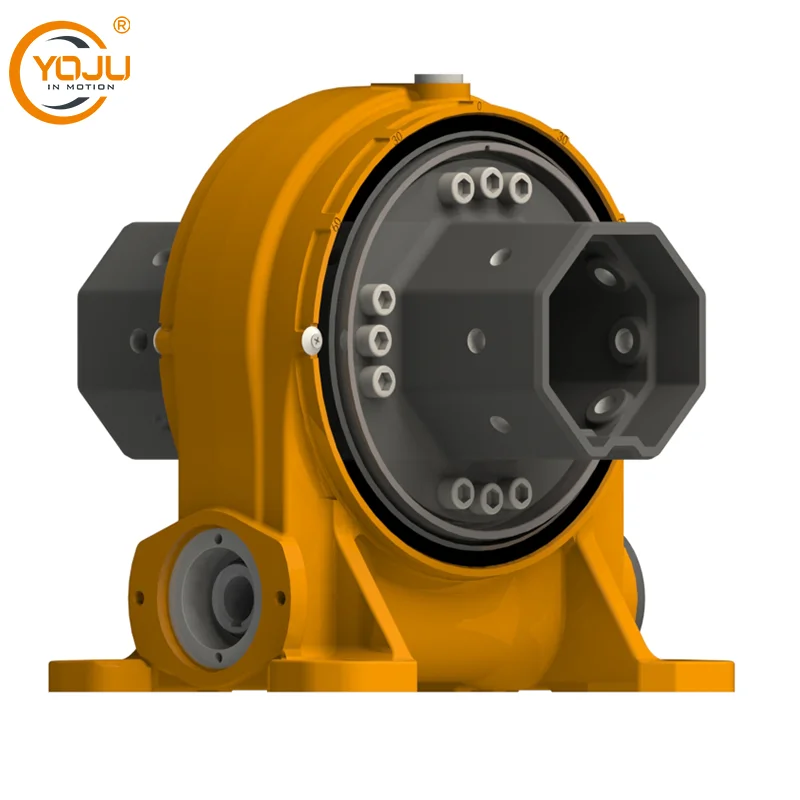- This topic is empty.
-
AuthorPosts
-
2025-01-15 at 5:39 pm #6377
With advancements in photovoltaic panels, energy storage systems, and mounting solutions, the efficiency of solar energy capture and utilization has grown exponentially. Slew drives, known for their versatility and power, are playing an important role in solar energy applications. In this blog, as a high precision slewing drive for solar tracking system manufacturer, YOJU will share the benefits of solar slew drive applications and explore how they can help optimize energy systems.
What is Solar Slew Drive?
Before we delve into applications, it' s essential to understand what a solar slew drive is. A slew drive is a compact mechanical device that enables rotational movement and positioning. It consists of a worm gear mechanism housed in a sturdy casing, designed to handle high torque loads with precision. In solar applications, these drives are tailored to track the movement of the sun, ensuring solar panels or collectors are always positioned at the optimal angle for energy absorption.
The term "solar slew drive" refers specifically to slew drives designed for use in solar tracking systems. These devices are engineered to operate in outdoor environments, withstanding extreme temperatures, humidity, and wind loads while maintaining their efficiency.
Applications of Solar Slew Drive for sale
1. Single-Axis Solar Trackers
Single-axis trackers are a popular choice in utility-scale solar farms. These systems use solar slew drives to rotate solar panels along one axis, typically east to west, to follow the sun' s movement throughout the day. By continuously adjusting the angle of the panels, single-axis trackers can increase energy output by up to 25-30% compared to fixed-tilt systems. Solar slew drives provide the precise and reliable motion required for these trackers, ensuring maximum energy capture.
2. Dual-Axis Solar Trackers
For even greater efficiency, dual-axis trackers use solar slew drives to adjust the position of solar panels along two axes. This allows the panels to track the sun' s movement both horizontally and vertically, optimizing energy capture throughout the year. Dual-axis systems are particularly beneficial in regions with varying sun angles or for concentrating solar power (CSP) systems, where precise alignment is critical for focusing sunlight onto a small area.
3. Concentrated Solar Power (CSP) Systems
Concentrated solar power systems use mirrors or lenses to concentrate sunlight onto a small area, typically a receiver, to generate heat that is then converted into electricity. In these systems, solar slew drives are used to position the mirrors or heliostats with high precision. Accurate tracking is essential in CSP systems to ensure that the concentrated sunlight remains focused on the receiver, maximizing thermal energy generation.
4. Photovoltaic (PV) Carports and Rooftop Systems
While ground-mounted systems often dominate solar installations, solar slew drives are also finding applications in innovative PV carports and rooftop systems. For carports, slew drives enable the adjustment of panel angles to maximize shading for vehicles while optimizing energy production. On rooftops, especially in urban areas, slew drives can help panels track the sun without requiring large installations, making them ideal for maximizing output in space-constrained environments.
5. Off-Grid Solar Applications
In off-grid solar systems, where reliability is paramount, solar slew drives provide a robust solution for tracking solar energy. From powering remote communication towers to supplying energy for isolated agricultural operations, slew drives ensure consistent energy capture to meet the demands of these critical systems. Their durability and low maintenance requirements make them ideal for such applications.
6. Floating Solar Farms
Floating solar farms, installed on reservoirs, lakes, or other water bodies, are emerging as an innovative solution to land constraints in renewable energy deployment. Solar slew drives can be used to enable trackers on floating platforms, optimizing the angle of solar panels despite the challenges of a water-based installation. By combining tracking with cooling effects from water, these systems can achieve enhanced efficiency and performance.

Benefits of Solar Slew Drive Applications
1. Enhanced Efficiency: By enabling precise solar tracking, slew drives significantly boost the energy output of solar systems.
2. Durability: Designed to withstand harsh outdoor conditions, solar slew drives offer long-term reliability and minimal maintenance.
3. Compact Design: Slew drives are compact and lightweight, making them easy to integrate into various solar tracking systems.
4. Cost-Effective: Despite their high performance, slew drives are a cost-effective solution for increasing the return on investment in solar installations.
5. Scalability: Solar slew drives can be used in a wide range of applications, from small rooftop systems to massive utility-scale solar farms.
Future of Solar Slew Drive Applications
As the global demand for renewable energy continues to grow, solar slew drives are poised to play an even greater role in the industry. Advances in materials, automation, and IoT integration are enhancing the capabilities of these devices, enabling smarter and more efficient solar tracking systems. For instance, combining solar slew drives with machine learning algorithms can improve real-time tracking accuracy, further optimizing energy production.
In addition, the rise of hybrid systems—combining solar with other renewable energy sources—opens new possibilities for solar slew drive applications. Whether it' s integrating with wind turbines or supporting innovative energy storage solutions, the versatility of slew drives ensures they will remain a vital component in the renewable energy landscape.
Conclusion
Solar slew drives are a game-changer in the field of solar energy, offering precision, durability, and versatility across a wide range of applications. From single-axis trackers to floating solar farms, these devices are helping to maximize energy capture and drive the transition to a more sustainable future. As technology continues to advance, the potential applications of solar slew drives will only expand, solidifying their role as an indispensable tool in the quest for clean, renewable energy.
-
AuthorPosts
- You must be logged in to reply to this topic.

